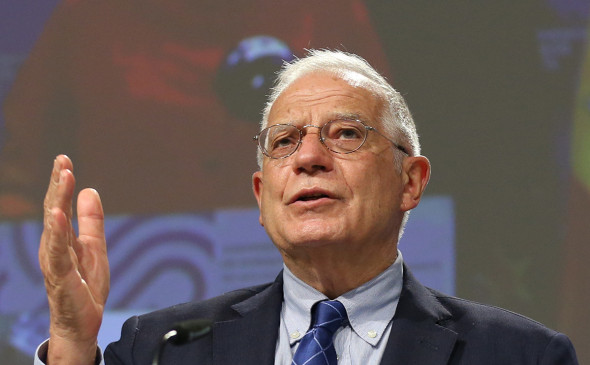Back in Kyiv

EU foreign affairs ministers will meet in Ukraine’s war-torn capital Kyiv ‘soon’, the bloc’s chief diplomat Josep Borrell announced on Monday (18 September).
Earlier this year, the EU side had already once visited the war-torn country for a meeting, including European Commission-to-Ukrainian government consultations and an EU-Ukraine summit.
“We will convene a meeting of foreign affairs ministers in Kyiv soon,” Borrell told reporters, speaking on the sidelines of the UN General Assembly in New York about preparations for the visit that should happen in October.
The main topics would be Ukraine’s EU integration, a show of support as the country finds itself in a critical phase of its counteroffensive against Russia and taking stock of some critical measures, such as military aid and further tightening of sanctions.
His comments came as EU foreign ministers met informally in New York on Monday to discuss Ukraine and coordinate their position for the UN General Assembly.
“We have coordinated our outreach to third countries – among all [EU] ministers – and I can tell you that, all together, we are going to have meetings with 133 partners here in New York during this week,” Borrell said.
His comments come as eighteen months into Russia’s war on Ukraine, Kyiv’s Western allies are struggling to court countries of the Global South and cope with a changing world order.
Speaking to reporters in New York, Borrell defined the common European position as the search for “peace, but a just peace” for Ukraine, based on Ukrainian President Volodymyr Zelenskyy’s peace plan, for which Europeans intend to gather “the biggest number of support” throughout the week.
“The UN General Assembly is the most important forum to generate international momentum to advance the peace efforts to support Ukraine (…) and here is the moment to do it”, Borrell said.
Regarding Russia exiting the Black Sea grain deal, which allowed the export of Ukrainian grain and Russian fertilisers through a safe passage in the Black Sea, Borrell said he “believes deep down that [Russia] does not want this agreement”.
“It is no longer an issue of lifting restrictions or sanctions since they do not affect Russian exports (…) those are excuses or false arguments,” Borrell said.
“Who’s going to pay for this? Apart from the Ukrainians itself – the ones who are going to be most receptive people in the most vulnerable countries in the world, in Africa and the Middle East and Latin America,” Borrell said.